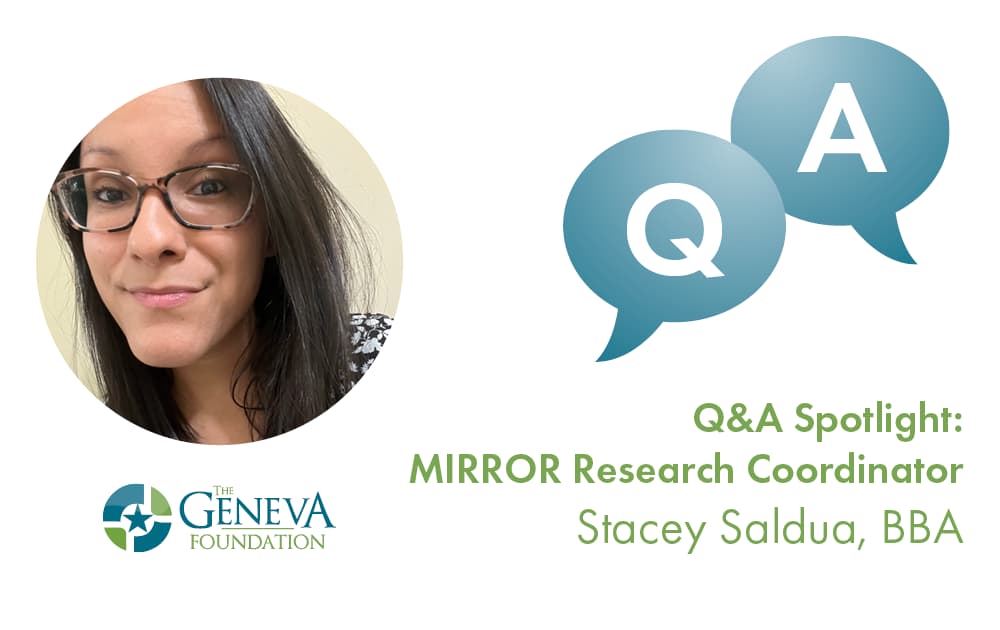28 January 2022
Alleviating Pain from Musculoskeletal Injuries: A Q&A with MIRROR Research Coordinator Stacey Saldua, BBA
The Musculoskeletal Injury Rehabilitation Research for Operational Readiness (MIRROR) program, led by the Uniformed Services University (USU) and administered by Geneva, has more than 40 clinically relevant MSI studies with the goal to improve readiness and resilience in the military.
Lower back pain (LBP) is extremely common and the leading cause of disability. However, the current way to diagnose and treat LBP can be challenging and comes with many risks. In MIRROR Project 3 Low Back Pain, researchers are conducting clinical trials on service members who are experiencing LBP with a minimal treatment option. This platelet-rich plasma (PRP) injection therapy may improve outcomes without destruction of tissues. These clinical trials hope to show that this healing process may improve participation with rehabilitation therapy and ultimately improve return to duty status.
MIRROR provides infrastructure, operational, and research support to advance the treatment and preventive care for service members with non-combat-related MSI. Geneva’s research coordinators are integral to the success of each research program. We spoke to Geneva Research Coordinator Stacey Saldua, BBA about her role and the impact it has on military medicine.
Please briefly explain your job.
I am a research coordinator at Womack Army Medical Center in the Pain Clinic. My job requires me to screen and recruit service members for our Chronic Low Back Study, to make sure they are a good fit for the study. I am in constant communication with them to ensure they are doing well, and I schedule their follow-up visits. While constantly screening service members for our study, it is also my job to keep up with our regulatory binders and make sure the team does not have any outstanding trainings due. My role as a research coordinator is very diverse and requires a lot of multitasking, as well as being very vigilant with entering data.
What kind of experience do you need to become a research coordinator?
One should have experience in time management, communication, and interpersonal skills since we work very closely with the site principal investigator. One should also have administrative skills, the ability to work independently, and have experience documenting and data entry.
Describe your role and the impact it has on the program you work on
My role as a research coordinator is to manage the regulatory components, coordinate and screen patients, ensure procedures are adequately performed, and manage the data collected from the study. The doctor relies on me to ensure we are screening patients and establishing good clinical practice during the study while they are performing daily clinic routines.
What is the best part of being a research coordinator in military medicine?
I like being able to work with service members who have served our country selflessly. They are in a lot of pain and need help when they come see us. I want to help service members get their life back and get some relief from their pain. I find it very rewarding to be able to give back to our service members in such an impactful way. This research helps them alleviate their pain so they can return to duty, but most importantly help service members enjoy their life again without as much pain, which sometimes can prevent them from even leaving their house.
What recent work can you share that most excites you?
We have enrolled seven service members into our clinical trial. Each time I enroll someone, it drives me to keep helping those in need of an alternative to their current therapies to help alleviate pain and improve their daily performance.

"I find it very rewarding to be able to give back to our service members in such an impactful way. This research helps them alleviate their pain so they can return to duty, but most importantly help service members enjoy their life again without as much pain, which sometimes can prevent them from even leaving their house. "
Stacey Saldua, BBA
HIGHLIGHTS
- The Musculoskeletal Injury Rehabilitation Research for Operational Readiness (MIRROR) program, led by the Uniformed Services University (USU) and administered by Geneva, has more than 40 clinically relevant MSI studies with the goal to improve readiness and resilience in the military.
- In MIRROR Project 3 Low Back Pain, researchers are conducting clinical trials on service members who are experiencing LBP with a minimally treatment option.
- MIRROR provides infrastructure, operational and research support to advance the treatment and preventive care for service members with non-combat related MSI.


